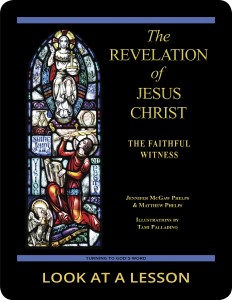times & seasons
 In the First Letter to the Thessalonians, Paul describes what the end times will look like and how the last days will come upon many as a surprise—while faithful Christians will be ready. In setting up this idea, Paul uses an interesting phrase. In the First Letter to the Thessalonians 5:1 (NABRE) he writes, “Concerning times and seasons…”. This odd phrase seems even more so in Greek.
In the First Letter to the Thessalonians, Paul describes what the end times will look like and how the last days will come upon many as a surprise—while faithful Christians will be ready. In setting up this idea, Paul uses an interesting phrase. In the First Letter to the Thessalonians 5:1 (NABRE) he writes, “Concerning times and seasons…”. This odd phrase seems even more so in Greek.
The word translated here as “times” is the Greek χρόνος (chronos). It refers to time in general or to a specific period or passage of time. What’s most interesting is that it’s used in the plural, an oddity in both Greek and English. The word translated as “seasons,” καιρός (kairos), refers most literally to a due measure. It the sense of time, it then either means a measured amount of time such as a set season or can refer to the fullness of time in a way that means the right time for something to happen. This word also is pluralized.
Because he uses both of the common Greek time words and uses them both in the plural, it appears that Paul is referring as much as possible to essentially everything to do with time. He suggests that practicing Christians are intimately familiar with how God is manifested in time, and so we won’t be surprised by what is coming.
Do you think you’ll see what’s coming, or will you be caught by surprise?
related topics: Ordinary Time; time
you also may like our study of the book of Revelation
 The Revelation of Jesus Christ: The Faithful Witness, a 23-lesson Catholic Bible study with an imprimatur, examines ways in which our traditional Christian view of heaven is built on Hebrew apocalyptic visions recorded in the Old Testament. This recently revised study includes maps and additional commentary and takes a close look at the role of the prophets in present-day Christianity. Illustrations by Tami Palladino depict the often-misunderstood images in the book of Revelation. Click on the book’s cover to view a sample lesson.
The Revelation of Jesus Christ: The Faithful Witness, a 23-lesson Catholic Bible study with an imprimatur, examines ways in which our traditional Christian view of heaven is built on Hebrew apocalyptic visions recorded in the Old Testament. This recently revised study includes maps and additional commentary and takes a close look at the role of the prophets in present-day Christianity. Illustrations by Tami Palladino depict the often-misunderstood images in the book of Revelation. Click on the book’s cover to view a sample lesson.
 Click on the picture of the statue of Moses with horns (above) to learn more about Lost in Translation. A new entry is archived each Monday. Contact us to receive Lost in Translation by email every week. You may use any of the contact links on our website to ask Matthew a question.
Click on the picture of the statue of Moses with horns (above) to learn more about Lost in Translation. A new entry is archived each Monday. Contact us to receive Lost in Translation by email every week. You may use any of the contact links on our website to ask Matthew a question.
